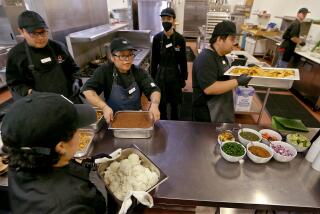High School’s Eatery Offers Student Staff a Recipe for Success
- Share via
For many people who eat at the Hungry Tiger, the bungalow cafe on the Paradise Hills campus of Morse High School is just a nice little place for an inexpensive but tasty breakfast or lunch.
After all, there are few places in town for 2-inch-thick French toast “made from butter bread, dipped in egg, milk and cinnamon batter, toasted golden brown and served with butter and syrup,” all for $1. Or the luncheon menu’s fish sandwich and chips for $2, “delectable tidbits of breaded Atlantic Ocean Cod, served on a toasted bun, served with French fries, tartar sauce, malt vinegar and a slice of lemon.”
To the Morse faculty and staff, and school guests who make up the restaurant’s clientele, the attentive, though inexperienced, student employees who prepare and serve the food enhance the already informal, unpretentious atmosphere.
Larger Role at Play
Only after several visits to the Hungry Tiger--and the chance to talk and watch the students and their instructor in action--do people begin to perceive the larger role this unique vocational education course plays.
For Dewayne Schilling, who founded the two-semester course 17 years ago and has shaped it ever since, his goal with the 90 or more students he teaches annually is not primarily to train legions of future food-service workers.
“Sure, you can’t lose knowing how to cook and prepare food,” said Schilling, who, before returning to college for his teaching credentials, enjoyed a food-service career in the Air Force, working for a while on the presidential jet, Air Force One, for Lyndon B. Johnson.
“But my philosophy is rather to show these kids how to find jobs, the mechanics of staying on the job and being successful, how to work with people and how to develop positive attitudes toward people and life.
“With that emphasis, they can go into the food business or any other business, work part time in cooking while going to college, whatever. It’s a win-win situation.”
Add to Schilling’s philosophy his caring but firm attitude toward students, and the recipe is complete for a course that shows how vocational education can coexist--even complement--the so-called basic-skills curriculum of
English, math and social studies at a time when job-related study has come under fire.
“We always perceive academics and vocational courses as either-or,” said Shirley Weber, the new San Diego city schools trustee from the Morse area and a strong supporter of an improved basic-subjects curriculum. “I think that the Hungry Tiger shows we can have both and they can complement each other. We do need these functional courses, but what I don’t want are situations where students are put only into (vocational education courses) and not given other options.”
“This is a great program,” teacher Connie Phillips said between bites of Hungry Tiger chili last week. “Dewayne has accomplished things for his students that you wouldn’t believe. These kids learn about math, work ethics, politeness as much here as in any other classroom.”
Schilling does all this while shuttling from the dining room, where he guides students on how to approach customers, to the well-equipped but frenetic kitchen, where students at the short-order grill tackle the art of mixing pancake batter while others handle vats of carrot cake mix near the ovens.
Senior Eric Fernandez was waiting on tables last week as part of his two-hour-a-day course work at the Hungry Tiger. “I took the course because I wanted some job experience in any category, and I also wanted to raise my grade-point average,” he said.
Fernandez credited Schilling with showing him how to prepare for a job and present himself in a positive manner.
‘Stresses Teamwork’
“I think that also I’ve been helped with my other courses,” the soft-spoken Fernandez said. “Mr. Schilling stresses teamwork, learning how to work with other people, how you should never give up on any work, that you should try hard, and that you can make new friends.” Fernandez plans to attend college next year and might consider a career in the military.
Vocational education has been criticized strongly in recent years for emphasizing too much training for specific occupations and for not stressing enough links to academics. Academic core-class requirements for graduation have increased in districts nationwide, leaving less time for students to take vocational classes. Educators expect that only those classes flexible enough to adapt to the educational reform movement will survive.
“I know about the criticism, but, at the same time, 85% of the student population probably is not going to college,” Schilling said. “I’m not saying don’t teach algebra, no way am I saying that. But I am saying that for some students, why not set up algebra or science like our class is structured, where we have class work instruction in the first semester, and then in the second semester we apply it. You could measure angles on buildings or understand decibels as they correlate to the kids’ music.”
Schilling said that success with his course requires that students perform as well as they do in their core classes. When Schilling teaches baking, he emphasizes that correct measurements and formulas are critical to a decent cake or blueberry muffin.
“Baking is an exact science, and the kids then begin to see a relationship between school and success in life, and they’ll lean back and say, ‘Yeah, I should remember this,’ instead of asking about the relevance of this and that. . . . We reuse and relearn things every day here, and I often ask them to try the same task in a different way the next day.”
Lessons Sink In
Not that the students innately pick up on the method behind Schilling’s madness. “At 16 or 17 years old, a lot of kids don’t know where they want to be,” he said. “It’s only a year or two later when so many come back to tell me they got a lot out of the class.”
Rick Whittington dropped in to say hi last week while Schilling was being interviewed. Whittington, 20, now works for American Pest Control. He graduated from Morse in 1986.
“What you learn in here helps you to go out and get a job if that is what you want to do,” he said. “And Mr. Schilling helps out all his students and treats you the way you want to be treated. I think I worked harder in other courses because of him, because I learned that all teachers aren’t the same, that others too were like Mr. Schilling.”
Senior James Ethridge would like to go into hotel management.
“Mr. Schilling, he really can deal with students in a group or one-on-one,” Ethridge said. “He has come down on me a couple of times, but he has been fair, and I sometimes do get a little wild. Last year, I was in and out of the (principal’s) office for a lot of petty things, but this course has matured me, and teachers have complimented me on my attitude. . . . I am doing better in classes now.”
In addition, Ethridge has become a “pretty good” cook. Last November, he cooked all but the Thanksgiving turkey for his family and relatives during their holiday get-together. He also said he now can cook up a real meal when he is hungry, instead of simply throwing a bag of instant noodles into boiling water.
Some students praise the food-management course but admit they signed up primarily because they thought it would be easy, despite the difficulty most have encountered in preparing a consistent pancake batter.
“This course is like a break to me compared to other classes,” junior Minnie Myers said. “I thought it would be fun and I want to learn more about cooking. I was a little surprised about all the things we did first semester in learning how to put together a resume and going out for a job interview, understanding what work requirements are.”
Senior Ray Martin isn’t sure how the course has helped him with school in general, although he concedes it has “added a little bit of discipline.” And, while he enjoys knowing how to cook more than a potato, he hopes for a career in computing after a stint in the military following graduation.
“Dewayne Schilling is amazing at what he can do,” said Evelyn Jones, the program’s assistant director for the past two years, after having worked as a security officer on the Morse campus.
“The word is out among students that he is fair; that is why this course has been so popular over the years,” Jones said. “He treats everyone the same and gets the ‘good’ out of the student that no one else will give a chance. We hear from other teachers who ask how we were able to get through to a student.
“Almost no student ever leaves the program. Mr. Schilling won’t let them.”
Schilling downplays his effect on students, saying simply that he will “touch students, hug students, chew out students, force them to deal with problems. . . . They’re not used to that. . . . We learn how to finish a job we start, how to communicate, how to understand someone’s cultural background a bit.”
“The kids see that I care about what happens to them,” Schilling said. He has few of what he calls “house rules,” but among them are no wearing of gang colors and no racial or other put-downs.
Even with all the counseling and personal-growth work that Schilling does with his students, he manages to train them to put out decent meals.
So as far as breakfast or lunch goes, just how good is the food?
Math aide Fumi Marquez is one of many faculty who choose the Hungry Tiger each day over the regular cafeteria food.
Said a confident Marquez--who at five months into her pregnancy is eating for two--as she wolfed down a Tigerburger with cheese the other day: “There is no competition.”
More to Read
Eat your way across L.A.
Get our weekly Tasting Notes newsletter for reviews, news and more.
You may occasionally receive promotional content from the Los Angeles Times.










